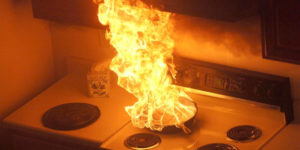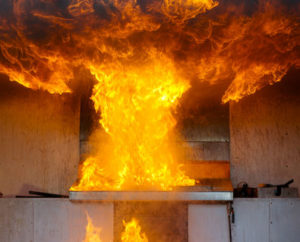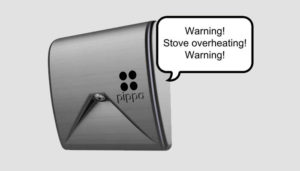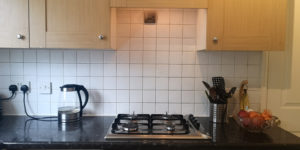Imagine telling the Health & Safety department that you can almost halve the number of all housefires. You can now!
Pippa is by far the most effective household fire prevention measure you can install.
Pippa is an innovation in the world of fire prevention. It can help to stop fires – before they start! Fires on the stove cause as many house fires as everything else – smoking, dodgy electrics, faulty appliances, gas leaks etc. all added together. Pippa, to use a conservative estimate, reduces the fire risk for householders by an incredible 40%*. For Landlords it also reduces the number of call-outs (because it can alarm before food starts to smoke), and will have beneficial implications for insurance fees, excess payments and the consequences of householder’s unpaid contents insurance. Pippa is probably the single most cost effective measure you can introduce to reduce fire risk. For higher fire risk households – the over 65’s – Pippa can pay for itself in less than 12 months in reduced fire damage claims. For lower risks, the payback is still less than 2 years.
Prevention is better than “cure” – surely? Tragically, despite all the rules and regulations, there are still many catastrophic fires that could have been prevented. With the Grenfell Tower disaster at the forefront of everyone’s minds, and being conscious of Health &Safety compliance and RSLs’ Duty of Care concerns. we hope that Pippa offers an opportunity to look at a new, effective, fire prevention system, instead of just focussing on fire reaction systems. Half of the UK’s 30,000 annual household fires start on the stove (e.g. when cooking is left unattended, when householders are distracted, by oil overheating , pans boiling dry, and stoves not being turned off properly etc.). Pippa will significantly stop this from happening.
Do tenants’ houses have fire alarms? Yes.
Do tenants’ houses have carbon monoxide alarms? Yes.
Do tenants’ houses have a fire alarm that tells them before they are going to have a fire? No. But they can now!
Please contact us if you are interested in running a Pilot Project with us:
We would like to run pilot projects with a number of Housing Associations to show how our fire prevention system works, and so that we can improve it through an iterative, collaborative process. Pippa protects people and their property and we’d like to establish the best framework for how our system would work within the management of RSLs, in a cost-effective way.
We’d like to fit 10-20 Pippa devices in houses F.O.C. They are quick and easy to install. and might best be allocated to houses that have had problems with fire and smoke alarms previously, or given to tenants within a risk profile: e.g. at-risk, vulnerable and elderly tenants (the probability of stove fires increases with age and for those living alone).
We’d like to create a positive feedback process whereby we can both monitor the Pippa alarms. We’d provide a report, e.g. at perhaps 3 and 6 months.
This would include an analysis of the number of times alarms were triggered, what the causes were and actions taken,
We’d also like to be able to collect feedback from the tenants:
If the warning alarms were triggered, were they effective? How quickly did the tenant respond or take action? How reassured do they feel having a Pippa alarm? etc.
In economic terms Pippa would pay back it’s cost in less than 2 years. We would also like to understand and analyse the insurance costs and implications of using Pippa for fire prevention. Currently £30/house/insurance policy is attributable to the cost of fires. Pippa will decrease the risk and payouts incurred by insurance firms and, once our system is adopted more widely, this should then reduce the cost of policies for our users.
In the short-term Pippa’s use would reduce the probability of paying excess fees for claims. Pippa’s use in preventing fires also offers the benefit of reducing the uninsured loss exposure of poorer tenants who have failed to take out adequate contents insurance.




There is lots of information throughout this website detailing the system and science behind Pippa. We’d recommend starting at the Home page, and we’re also always happy to hear from you if you have any questions. In summary…
It can detect when these become too hot and have the potential to ignite, or haven’t been switched off properly, and can tell when the cook is not attending to them. Pippa isn’t an alarm that is triggered because there is a fire – it warns you minutes before a fire actually starts.

When it comes to fire prevention every second counts. As Pippa detects a fire risk, it will start to notify a tenant as follows:
The alarms can all be cancelled by the tenant at any time (simply by blocking the view of the thermal sensor for 3 seconds – by e.g. putting a hand, or spatula under the Pippa device) – and a text message is automatically sent to say that the situation is now attended to.
The text message system is a unique innovation designed to maximise the opportunity for RSLs to prevent a fire. Pippa can message a centralised number (e.g. a fire safety office) that a stove temperature situation has become critical. This number can be pre-programmed so that your Pippa devices arrive ready to install and turn on. Simple!
In addition Pippa can be programmed to offer a bespoke escalating system of warnings (notification/alarms/texts) to suit your level of risk and tenant profiles. E.g. a person with early signs of dementia might put a tray on a stove that isn’t turned off properly. In fact people aged over 65 are twice as likely to accidentally start a fire on their stove,
*Our fire risk and prevention statistics and insurance costs are based on an in-depth analysis of the Fire statistics incident level datasets. The Home Office collects detailed information on incidents attended by Fire and Rescue Services. e.g. 6% of cooking fires are discovered immediately and are either chip pan or article too close to heat (they would be likely to happen anyway, regardless of the presence of a Pippa). The remaining 94% of stove fires could potentially be prevented by a Pippa. We can also provide a far more in-depth cost benefit analysis of the economic benefits of Pippa upon request. e.g. vs a more expensive gas shut off device and their additional costs incurred with CORGI system resets etc.
Pippa was invented specifically to target the most common causes of household fires. As our invention is still so new we’d be happy to work with RSLs to develop Pippa to suit your needs. Please feel free to contact us with any thoughts and questions (e.g. one question we have been asked is about deaf tenants – and could the text message be sent earlier as they might be more attentive to their phone?).
Given the cross-section and variety of RSL tenants, based on the UK fire statistics over the last 10 years, we can help you look at your tenant database for the households with the greatest fire risk, and to help prioritise who might benefit from having a Pippa in their kitchen.
Put simply, implemetning Pippa decreases the chances of a household fire by an incredible 40%!